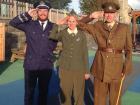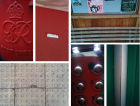Local Study
The importance of local history for developing a sense of place and identity is emphasised by the National Curriculum. The local landscape and buildings can often reveal a great deal about the use of land and the type of people who lived there in the past. Buildings and landscape can reveal how long a heritage the place has had. Monuments and local heritage or parish records can highlight individual local heroes or provide a window into the lives of ordinary local people in times gone by. How similar or different were their lives? Often, the local picture can also help to reveal the national or international picture.
Sort by:
Date (Newest first) | Title A-Z
Show:
All |
Articles |
Podcasts |
Multipage Articles
-

Scheme of work: Local history – the story of our High Street
ArticleClick to view -

Local significant individuals
Multipage ArticleClick to view -

Film: Discovering local and family history
ArticleClick to view -

Local Community and History Month 2024: Students’ local history stories
Multipage ArticleClick to view -

A Significant Local Event: Carlisle floods
ArticleClick to view -

Trees
ArticleClick to view -

Exploring the history of our place with very young children
ArticleClick to view -

Teaching ‘changes within living memory’: making the most of your school
ArticleClick to view -

Using some more unusual sources in the primary classroom
ArticleClick to view -

World War II: breathing life into a local history enquiry
ArticleClick to view -

Teaching local history in primary schools: learning about effective practice
ArticleClick to view -

Teaching black British history through local archives
ArticleClick to view -

How local history can bridge the gap...
ArticleClick to view -

Significant anniversaries: the infamous Beeching Report 1963
ArticleClick to view -

Scheme of work: Significant historical events, people and places in their own locality
ArticleClick to view -

Using oral history in the classroom
Multipage ArticleClick to view -

Teaching about Remembrance Day in EYFS
ArticleClick to view -

Artefacts in the neighbourhood
ArticleClick to view -

School war memorials as the subject for enquiry-based learning
ArticleClick to view -

What’s in a road? Local history at Early Years and Key Stage 1
ArticleClick to view

